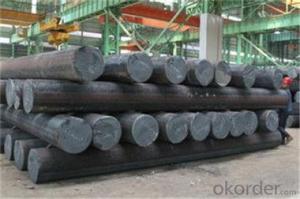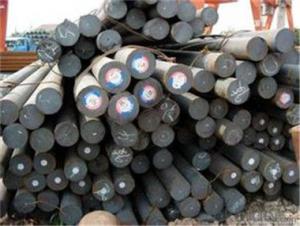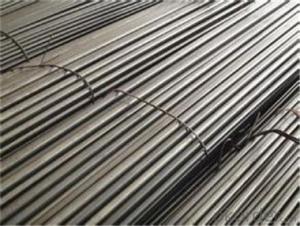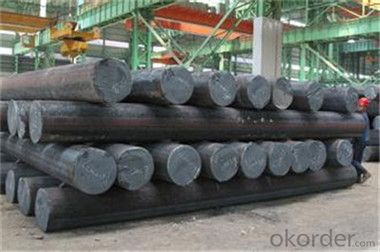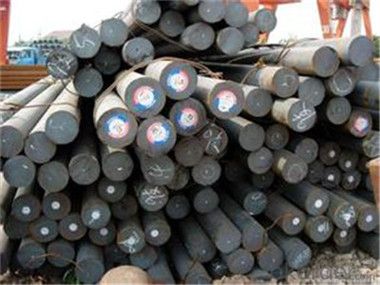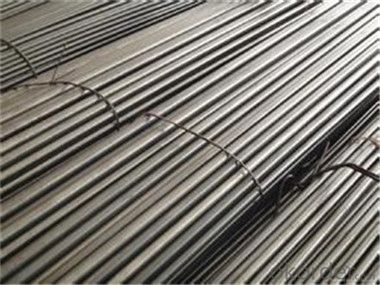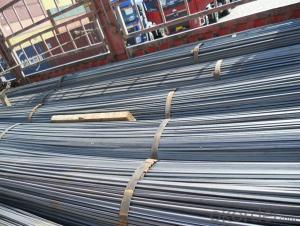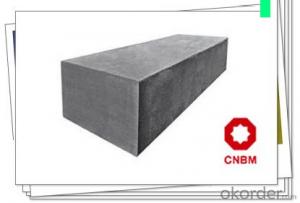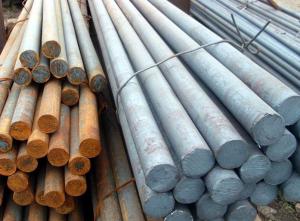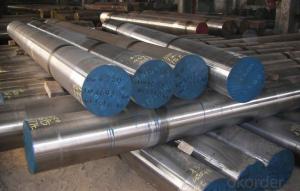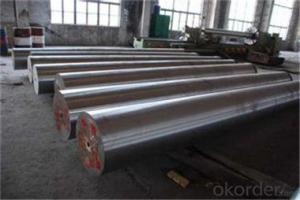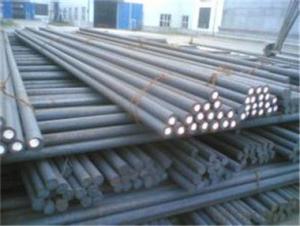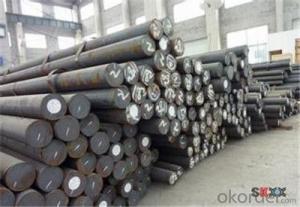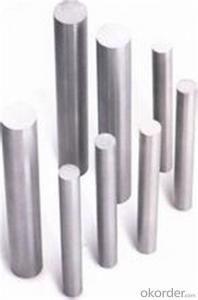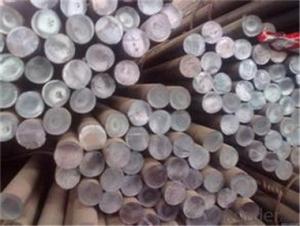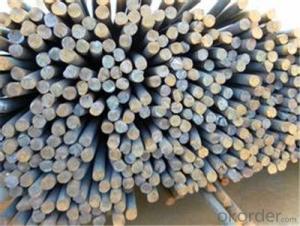Steel Round Bar Reliable Manufacturers from China
- Loading Port:
- Tianjin
- Payment Terms:
- TT OR LC
- Min Order Qty:
- 554 m.t.
- Supply Capability:
- 2000000 m.t./month
OKorder Service Pledge
OKorder Financial Service
You Might Also Like
Description of steel round bar:
1. Commodity: Round steel bar
3. Technical: Hot rolling
2. Length: Min. 5.8meter, according to requirement.
3. Diameter: 16mm-250mm
Festures of steel round bar:
1.Dia 80-800mm Length:2000-13000mm or as required
2.Technique:Forged
3.Delivery Time:45 days
Specifications of steel round bar:
1. Standards: AISI 4340 8620 8640 4320 , JIS SNCM8 GB:40CrNiMoA
2. Specification: Dia: 80~450mm Length:2000-13000mm or as required
The highest temperature is 427 degrees Celsius.it has good strength,and high quenching property ,the toughness is good and small deformation during quenching.At high temperature.
C | Si | Mn | S | P | Cr | Ni | Cu | Mo |
0.37-0.44 | 0.17-0.37 | 0.40-0.80 | 0.025(max) | 0.025(max) | 0.60-0.90 | 1.25-1.65 | 0.025(max) | 0.15-0.25 |
Images of steel round bar:
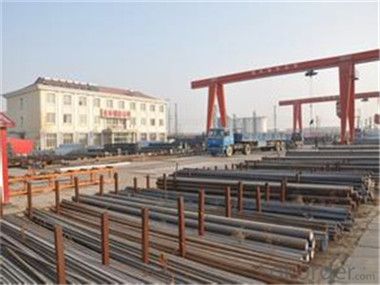
FAQ:
1. What is your package?
Packing situation: standard seaworthy packing or as customer required.
2. How long is the lead time?
Delivery time: 45 days after order confirmed.
3. What payment term do you accept?
Payment: T/T or L/C at sight.
- Q: Can steel round bars be used in outdoor applications?
- Indeed, outdoor applications can make use of steel round bars. Steel, being a robust and long-lasting material, possesses corrosion resistance, thus rendering it suitable for outdoor purposes. Construction, manufacturing, and infrastructure projects frequently employ round bars to offer structural support and reinforcement. Furthermore, steel round bars exhibit the ability to withstand diverse weather conditions, such as rain, snow, and extreme temperatures, while retaining their strength and integrity. Nevertheless, it is crucial to carefully choose the most suitable type of steel for the specific outdoor application to guarantee optimal performance and longevity.
- Q: Are steel round bars suitable for marine applications?
- Yes, steel round bars are suitable for marine applications. Steel is known for its excellent strength and corrosion resistance, making it an ideal material for use in marine environments where it is exposed to saltwater and other harsh conditions. Steel round bars can be used in various marine applications such as boat building, marine structures, and offshore platforms, providing durability and reliability. Regular maintenance and appropriate coatings can further enhance their longevity and performance in marine environments.
- Q: Can steel round bars be used for making bicycle frames?
- Yes, steel round bars can be used for making bicycle frames. Steel is a commonly used material for bicycle frames due to its strength, durability, and relatively low cost. Steel round bars can be shaped and welded together to create a sturdy and rigid frame that provides stability and support for the rider.
- Q: Can steel round bars be used in the telecommunications industry?
- Yes, steel round bars can be used in the telecommunications industry. Steel round bars are commonly used to provide structural support for various telecommunications equipment such as antennas, satellite dishes, and communication towers. These bars are highly durable and can withstand harsh weather conditions, making them suitable for outdoor installations. Additionally, steel round bars can be easily fabricated and shaped to meet specific design requirements, allowing for the integration of various components in the telecommunications infrastructure.
- Q: Are steel round bars available in different lengths?
- Yes, steel round bars are available in different lengths.
- Q: Are steel round bars suitable for machining applications?
- Yes, steel round bars are suitable for machining applications. Steel round bars are known for their excellent machinability, which means they can be easily shaped, cut, and drilled using various machining techniques such as turning, milling, drilling, and grinding. They are commonly used in industries such as automotive, aerospace, construction, and manufacturing, where precision and durability are crucial. Steel round bars offer high strength, toughness, and resistance to wear, making them ideal for machining applications that require high-performance components or parts. Additionally, steel round bars are available in a wide range of grades and sizes, allowing for versatility in meeting specific machining requirements.
- Q: What is the difference between carbon steel and alloy steel round bars?
- Carbon steel round bars are made primarily of carbon and iron, while alloy steel round bars are made of carbon, iron, and other elements such as chromium, nickel, or manganese. Alloy steel round bars have enhanced properties such as increased strength, hardness, and resistance to corrosion, making them ideal for applications that require higher performance. On the other hand, carbon steel round bars are more affordable and have good machinability, making them suitable for general-purpose use.
- Q: What is a steel round bar?
- A steel round bar, a lengthy metal rod with a circular shape, is usually made of strong and durable steel, an alloy composed mainly of iron and carbon. The round bar finds wide usage in industries like construction, manufacturing, and engineering, thanks to its flexibility and dependability. It is frequently employed as a structural element in buildings, as reinforcement or support in concrete structures, or as a part in machinery and equipment. The round shape enables effortless handling, machining, and welding procedures. Steel round bars are available in different diameters and lengths, and they can be further tailored or manufactured to suit particular project needs.
- Q: What is the maximum weight of a steel round bar?
- The maximum weight of a steel round bar depends on its diameter and length. The weight can vary from a few pounds to several tons for larger and longer bars.
- Q: What are the advantages of using nickel-chromium alloy steel round bars?
- There are several advantages of using nickel-chromium alloy steel round bars in various applications. Firstly, nickel-chromium alloy steel round bars have excellent corrosion resistance properties. The presence of nickel and chromium elements in the alloy enhances its ability to resist corrosion from various environmental factors such as moisture, chemicals, and oxidation. This makes these round bars suitable for use in challenging environments such as marine applications, chemical processing plants, and oil refineries. Secondly, nickel-chromium alloy steel round bars offer high temperature resistance. The combination of nickel and chromium elements in the alloy allows it to withstand elevated temperatures without losing its structural integrity. This makes them suitable for use in heat exchangers, furnaces, and other high-temperature applications. Additionally, nickel-chromium alloy steel round bars have superior mechanical properties. They exhibit excellent strength, toughness, and wear resistance, making them ideal for applications that require high load-bearing capabilities. These round bars also exhibit good ductility, allowing for ease of machining and fabrication. Moreover, nickel-chromium alloy steel round bars have good electrical conductivity. This makes them suitable for electrical and electronic applications where conductivity is essential, such as in the manufacturing of resistors, heating elements, and electrical connectors. Lastly, nickel-chromium alloy steel round bars are readily available and cost-effective. As a widely used material in various industries, these round bars are easily accessible and can be obtained at competitive prices. In summary, the advantages of using nickel-chromium alloy steel round bars include excellent corrosion resistance, high-temperature resistance, superior mechanical properties, good electrical conductivity, and cost-effectiveness. These characteristics make them a preferred choice for a wide range of applications in industries such as construction, automotive, aerospace, and electrical engineering.
Send your message to us
Steel Round Bar Reliable Manufacturers from China
- Loading Port:
- Tianjin
- Payment Terms:
- TT OR LC
- Min Order Qty:
- 554 m.t.
- Supply Capability:
- 2000000 m.t./month
OKorder Service Pledge
OKorder Financial Service
Similar products
Hot products
Hot Searches
Related keywords
